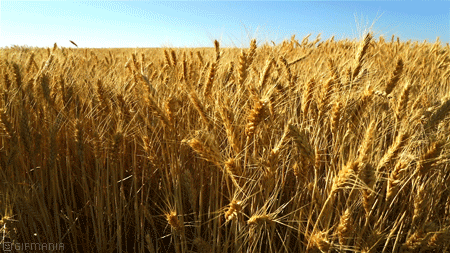A New Study Links Protein In Wheat To Inflammation In Chronic Health Conditions

For those who are well-versed in nutrition, it's no surprise to them that wheat might promote inflammation. But now a new study has come out and confirmed just that.
The new research was discussed at the recent United European Gastroenterology (UEG) Week, that took place in Vienna, Austria.
The conference is held in order for specialists within the gastroenterology community to come together and talk about the latest research in the field. Scientists there discussed what they say is new research which supports the notion that the consumption of ATIs (amylase-trypsin inhibitors) can promote inflammation in tissue beyond the gut.

The study was conducted by Professor Detlef Schuppan from the Johannes Gutenberg University that's located in Germany. Scientists say that the wheat triggers chronic health conditions like rheumatoid arthritis, asthma, and more. The ATIs are said to make up about 4 percent of wheat proteins. They assert that ATIs can contribute to inflammation in areas like the spleen, brain, kidneys, and nodes, they say.
And they warn that they can also likely worsen symptoms related to illnesses like lupus, asthma, multiple sclerosis, and rheumatoid arthritis.

There are countless different illnesses and diseases which are said to be rooted in prolonged chronic inflammation so this information is vital in trying to better understand those illnesses and trying to possibly craft a variety of treatment approaches.
Researchers are currently working on studies to investigate this further, in order to better understand the impact that ATIs have on chronic health conditions like those mentioned above.
Pics: pixabay
this isn't medical or health advice and shouldn't be relied upon as such for any diagnostic or treatment purpose. I do not endorse any specific procedure, test, diet, or treatment. This is posted as an information resource only
sources:
https://www.eurekalert.org/pub_releases/2016-10/sh-nsl101016.php
http://www.medicalnewstoday.com/articles/313514.php
http://www.cdc.gov/pcd/issues/2012/11_0301.htm
https://www.sciencedaily.com/releases/2012/04/120402162546.htm
Thanks for this. It's a HUGE issue that few have even dared consider.
There's a lot more than needs to be studied here. A few points:
A result of this is that flour has basically no nutritional value. It's empty calories, but still high in carbs and excessive gluten. A hundred years ago, nobody had gluten intolerances. Thanks to modern technology and big ag, it's almost epidemic.
Most of us in "advanced" cultures where we've adopted a western diet will experience bloating from wheat products now, especially as we get older.
also, glyphosate is being used to "burn" the wheat before harvest. this causes the wheat to die and in the dying, the plant puts it's last bit of energy into finishing the seed, taking the glyphosate into the seed with the rest. this herbicide also has major heath effects, disrupting collagen synthesis, interfering with sulfation and methylation pathways, chelating out vital minerals, killing necessary intestinal flora, etc. organic wheat will not have this. i have been 95% off wheat for 6 years and have improved performance considerably. i find fewer heath problems with sourdough.
Yeah, glyphosate is terrible on multiple levels. I didn't know they forced the wheat to mature using it though. Very interesting/tragic.
Fermenting IS the technical term :-) Making sourdough breads is probably the most common. Sadly even that isn't enough for some people.
No, it's really not. Once your system has been harmed to a certain point, it seems almost impossible to recover. You can only ingest so much poison, and each of us has a different tolerance level.
My wife can't touch wheat products anymore, literally. She'll break out in a rash wherever her skin comes into contact. She makes her breads from alternative grains and/or other sources.
I have backed off all wheat products substantially. Today I can eat something with so-called bread and not notice anything. But if I try to for more than a couple of days in a row, I'll start feeling it. My energy level drops, digestion is off (in a few ways) and I get a bloated feeling.
Best is if kids are brought up on the good stuff, so their bodies are strong. It's sooooo hard to get parents to listen though, since just giving them sliced bread, cereal and cheap snacks is so much more convenient. I wish I knew then what I know now, but I guess that's life, isn't it?
thanks for posting all this great info
Thanks for sharing the info.
I love my bread, but if it is killing me (like sugar) then I'm happy to cut it back.
The more independent research into stuff like this the better.
Followed.
why is it always the tasty stuff? lol
Great post. I upvoted.
BTW, there are great bread substitutes like Millet. They've come a long way that to me is no different than wheat bread.
I am into sweet potato toast now lol and cauliflower pizza crusts
While we still eat wheat products on occasion, removing/reducing most bread, pasta and other wheat containing products has had a major effect on our health. My hubby hasn't had a Multiple Sclerosis flare-up for years and is off his weekly injections for more than two years now. No issues at all. Moderation is key! Also, a lot of people tend to be sensitive, intolerant or allergic to wheat! For them, wheat-free products is a must. However, note that reducing grain products to a minimum is not the only thing we did to improve health. Reducing meat intake, eliminating processed foods and eating more fresh vegetables and fruits are also important to create good health.